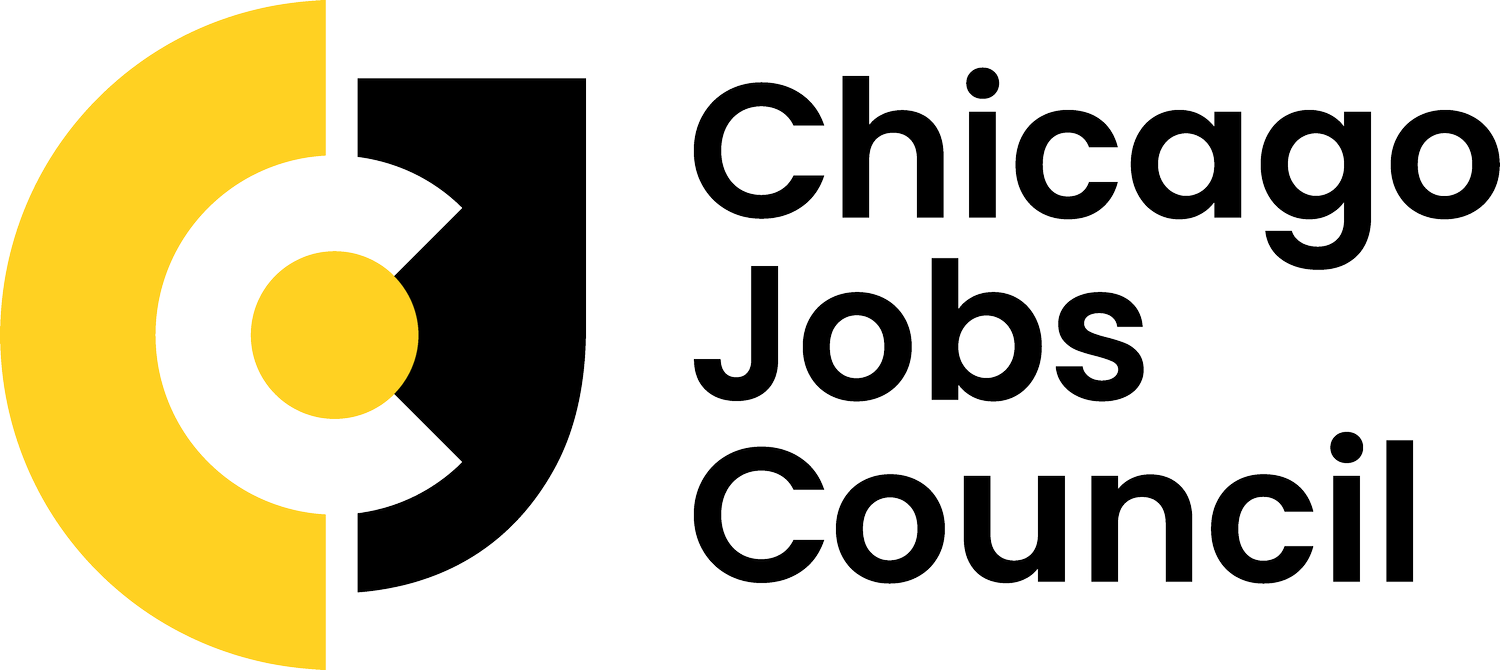Addressing Historical and Intergenerational Disparities for People of Color
On January 24th, 2024, the Chicago Jobs Council (CJC) hosted the first of a three-part series of Policy Community of Practice events. Held at CJC’s downtown office, the gathering aimed to provide a collaborative space for the co-creation of innovative and inclusive policy designs under the theme of addressing historical and intergenerational disparities for people of color. The ultimate goal was to encourage workforce professionals and policy advocates to reimagine their approaches, envisioning a future where policies are not only equitable but also just, where people of color can thrive, and where anyone can find pathways out of poverty.
Sparking a Dialogue
The event drew together a diverse group of participants from organizations that span the workforce development landscape – the Illinois Department of Commerce and Economic Opportunity (DCEO), NewMoms, Chicago Housing Authority, and Growing Home, to name a few – all passionate about addressing the deep-rooted issues surrounding employment equity and intergenerational disparities. Inspired in part by an article published by the Economic Policy Institute entitled ‘Chasing the dream of equity: How policy has shaped racial disparities’, the discussions navigated how policies have historically shaped racial economic disparities and how new approaches can pave the way for a more equitable future.
With facilitation support by CJC staff, event attendees contemplated the difference between merely addressing historical and intergenerational disparities and actively working towards repair. Concluding that efforts like Diversity, Equity, and Inclusion (DEI) and using race-explicit language take organizations a long way in these endeavors, participants highlighted the importance of concrete actions to redress historical injustices.
The EPI article played a crucial role in guiding the conversations, providing a comprehensive analysis of how policies have contributed to racial economic disparities. For example, the article summarized three poorly implemented federal policies that resulted from the Civil Rights movement: the Equal Opportunity Act of 1972, the Job Training Partnership Act of 1982, and the 2014 Workforce Innovation and Opportunity Act. The article states that, “with the exception of the Equal Opportunity Act of 1972, these bills were largely focused on helping Black American workers and job seekers catch up on skills and training, but failed to rectify structural and systemic inequalities that created disparate outcomes, including unequal implementation of workforce programs.” By grounding the discussions in historical policies and practices, participants gained a deeper understanding of the structural issues that place barriers to gainful employment, including the cost of higher education, the removal of trade skills programs in public schools, and biases against returning residents.
The event further explored the question, “How does employment equity lead to wealth-building opportunities for people of color?” Participants delved into this topic, with answers highlighting that employment equity shifts individuals out of survival mode, enabling them to contemplate and pursue wealth-building and wealth-preserving opportunities like home ownership, investing, and insurance. This emphasis on breaking the cycle of inequality by fostering economic stability showcased the event’s commitment to addressing both present disparities and creating a more equitable future for generations to come.
As attendees engaged in vibrant discussions, one of the focal points was the question, “What does employment equity mean to you?” This prompted participants to share their perspectives on the matter, with recurring themes including providing a fair chance for everyone to secure any job, ensuring fair compensation, and advocating for hiring processes that treat all applicants equally. Attendees referenced contemporary policies that are shaping the way our workforce is trained and supported, including The Climate and Equitable Jobs Act (CEJA) and Workforce Innovation and Opportunities Act (WIOA).
Taking Action
By creating a space that encouraged open dialogue and exchanging ideas, the event became a hub for cultivating fresh approaches to workforce development. The discussions also illuminated the lasting impact of discriminatory policies, emphasizing the need to confront historical injustices to affect meaningful change. Participants expressed a strong collective commitment to transformation and justice in the field of workforce development, stressing the need for tailored approaches that promote inclusion of all people regardless of their race, gender, education level, or involvement with the justice system.
In conclusion, CJC’s event served as a catalyst for change. By fostering collaboration, encouraging open dialogue, and incorporating fact-based examples provided by EPI’s research, the event provided a platform for the co-creation of innovative and inclusive policy designs. CJC staff look forward to the next Policy Community of Practice event, which will be held in March.




